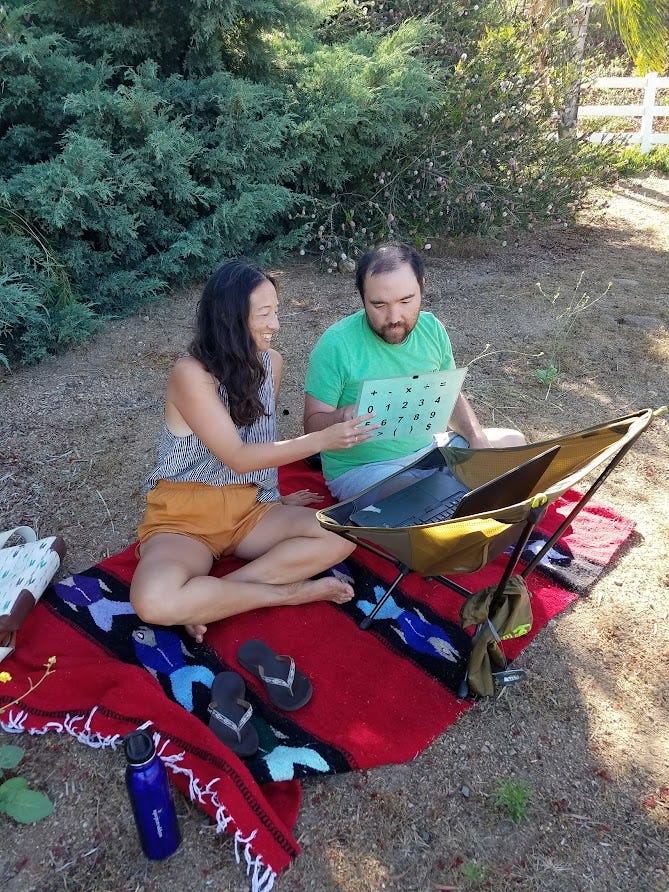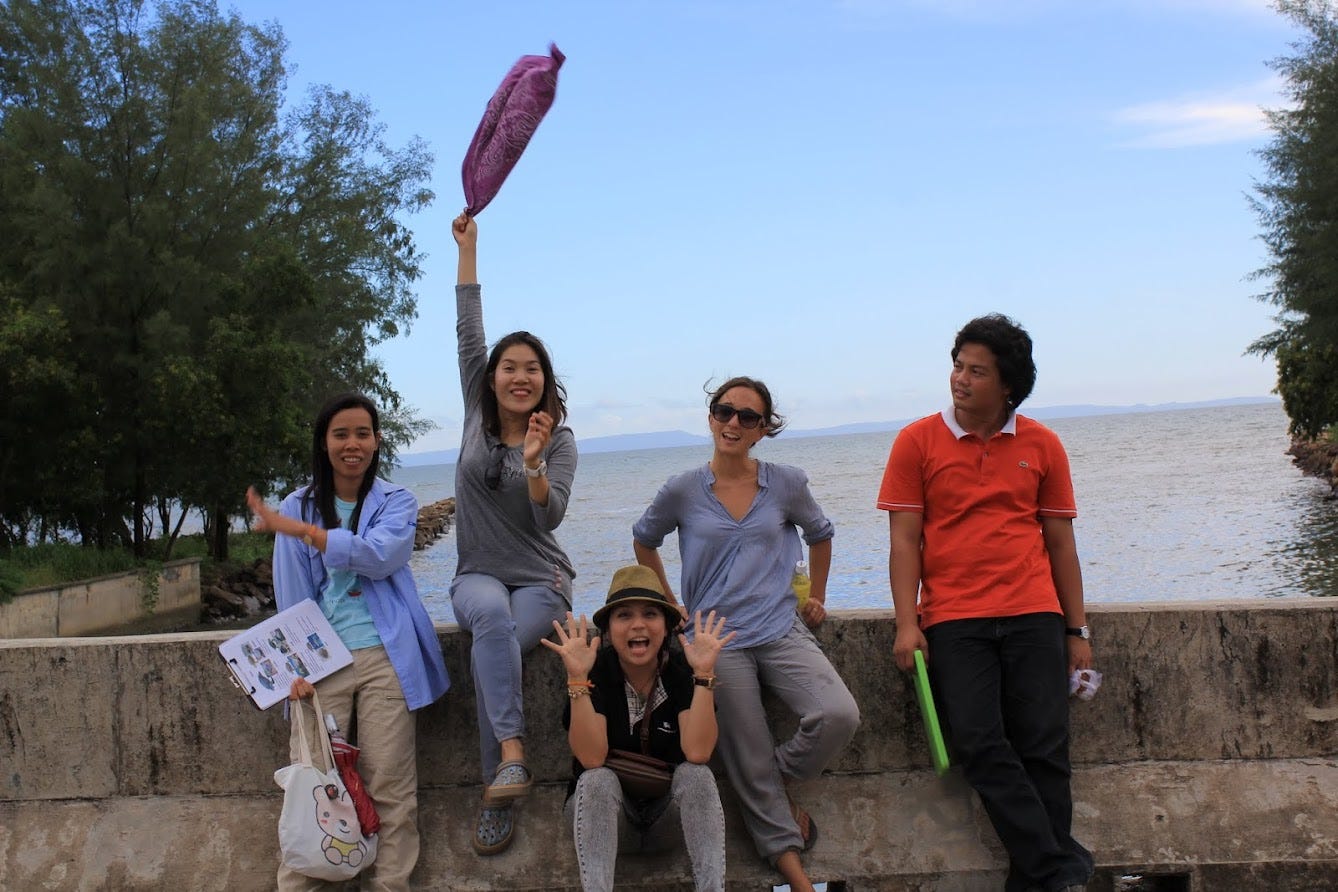Milestones, shifting dreams, & interdependence
And yes, the podcast is still alive - I've just been awfully tired
Well, all, I had originally planned a ~2 week gap in episodes so that I could better wrangle some overlapping contracts and various (too many) other commitments. And here we are, more than 2 weeks later! I am pretty antsy to get these next episodes out to you, because they include fantastic conversations with some absolutely brilliant folks (as with all the interviews).
I was going to push to get one posted today, but… it’s my 40th birthday tomorrow (or, already today, for my friends in time zones farther east). And though it is quite the milestone - a decade closing, a new one beginning - the main way I want to observe it is by relaxing and feeling grounded in the life I have now. Episodes will resume next week!
If you’ll indulge me by reading on, I have some brief personal thoughts to share. My 30s were truly astounding, now that I look back and reflect: finishing my PhD fieldwork and finally earning that degree; exploring new ideas and locales during my postdoc; living in Myanmar while working for an international conservation organization; and making the decision to drastically change my life by moving back to the US to be my brother’s primary communication support in late 2019. And now, I’m approaching the end of my training as a practitioner to support other nonspeakers in accessing communication, running my own sufficiently successful conservation consulting business, and joining my brother’s impressive, world-changing journey as he grows as a disability rights advocate and writer.
It’s a world away from what I’d anticipated for my life a few years ago. Transitioning to the fully applied realm of conservation felt so *right* to me. It was so invigorating compared to the more removed world of academia, and I fully envisioned myself continuing to travel the world, living in different countries over time and immersing myself in meaningful and innovative conservation work. I saw firsthand how much potential there was for thoughtful, inclusive approaches to make substantial differences in how conservation functions, and I was ready to dive in!
Candidly, it’s been hard at times to acknowledge that this sort of full-time work in international conservation is no longer part of my life path. It’s been particularly hard to feel tethered to one place, when I’ve always resonated with a more peripatetic lifestyle. My first realization of this new reality was when a job opening related to fisheries management in New Caledonia popped up about six months after I started working with my brother. The South Pacific? A place to finally polish my French language skills? Surfing and diving? A dream! (Oh, and the work sounded fulfilling, too…heh). He overheard me talking it out with our mother: “Gosh, I’d love to apply to this job… I’ve been wanting to start working more in the Pacific islands… but I can’t, right? I can’t. Should I just apply and see?”
A bit later, we were working together, and he spelled out (he communicates by spelling his words on a laminate board with the alphabet on it): “I overheard you talking about that job. I am so sad that you are thinking about leaving. It hurts my heart."
And then, even more morosely: "I am also so sad that I cannot go after my own dreams myself. I am always left behind." To provide you with more context: he’d had pretty much no way to communicate in his daily life until I moved back. Imagine being trapped in a body that won’t let you signal, in any reliable way, how you’re feeling, what you need, what you’re thinking. It’s terrible. With me supporting his communication, his universe had opened up. He could write poetry and songs and essays; he could make friends all over the world; he could pick out his outfits, tell us what he wanted to eat, let us know if he was feeling bad; he could tell us he loved us, and also delight us with awful jokes. And me clinging to my old dreams meant him losing the beautiful new ones that he’d never dared to dream before.
He wrote a poem the next day entitled “Don’t go to New Caledonia.” It made me cry. And he cried, too, for the first time since he was a toddler.
Truly, though, I wouldn’t have left. Sure, there was that sense of obligation to my little brother, but also - in a more self-centered way - supporting his communication has been the most fulfilling, important thing I’ve ever done with my life. That feeling of invigoration I experienced when entering the applied world in conservation? Sure, that was great. But it pales in comparison to what I feel when I’m with my brother, and when I’m supporting other nonspeakers as they access communication to share their own voices with the world.
Working with my brother and his peers, who have been overlooked, marginalized, and mistreated their whole lives (and still face systemic ableism, even with communication), has taught me so much about humans and the systems in which we exist. I’ve long believed that conservation needs to learn from other sectors, and what I’ve learned from disability rights advocates absolutely confirms this belief. There are so many parallels with what I’ve observed in the conservation world, and this is part of the reason why a lot of my thinking on this podcast centers around the idea of “human processes.” Whether it’s conservation, or public health, or education, or how society treats disabled people, it all comes down to how humans interact with each other (with issues of power, inclusion, and respect interwoven throughout).
A major point of learning has been to embrace the notion of “interdependence” - a common term in disability justice circles. It’s a celebration of the beauty of humans supporting other humans. It clarifies that we are all connected and all dependent on others in some form or another. It emphasizes that supporting others should mean that, through your actions, they are better able to exercise their autonomy and agency in their own lives. And it is not a relationship that only benefits one party; in an interdependent world, we all benefit from working together in community. As much as people praise what I do for my brother, I need them to know that my life has also grown more rich and vibrant from this partnership with him - and that his work is changing the world for many, many nonspeakers and their families. In conservation: as much as it seems like the morally “right thing to do” to engage in inclusive, collaborative processes, it’s also the mutually beneficial thing to do, because such processes will yield more diverse, sustainable, and effective ideas that are shared through mutual learning. It’s not an act of charity, and it’s not something you can half-heartedly act out. It’s an ethos that needs to be genuinely integrated into how we conceptualize and undertake our work.
My brother will actually be the final interview for this podcast’s first season, sometime in August, so stay tuned for more thoughts on some of the ideas above and much, much more. Part of my new set of dreams is to continue to contribute to conservation in a way that works with my new reality, and in a way that I think offers something that isn’t yet widely available. This podcast is one of my current means of doing so. Though it’s a rather modest project, I’m still very proud to have gotten it up and running this year. And I’m so appreciative that you are following along!





